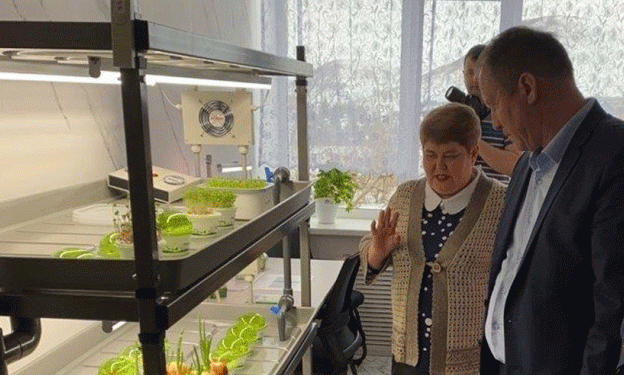In March 2025, the Novosultangulovskaya School in Asekeyevsky District, Orenburg Region, became the site of an exciting innovation in agricultural education—the region’s first hydroponics classroom. Equipped with advanced technology, including automated plant-growing systems, a microclimate control system (regulating temperature, humidity, and ventilation), and a powerful microscope with 10,000x magnification displayed on a large screen, this classroom allows students to observe and study plant growth in a soil-free environment.
The hydroponics lab was made possible by the initiative and financial support of local entrepreneur Rinat Davlyatov. The project is recognized by the regional Ministry of Agriculture as a model of social partnership that has both educational and career development value. Students in this lab will cultivate peas, wheat, onions, and other crops under artificial growing conditions, gaining practical skills in a high-tech agricultural setting. Moreover, the lab is open not only to students from this school but also to others in the district, expanding access to agricultural innovation.
This school-based hydroponics initiative aligns with broader global trends. According to a 2024 report by MarketsandMarkets, the hydroponics market is projected to grow from USD 12.1 billion in 2023 to USD 25.1 billion by 2030, at a compound annual growth rate (CAGR) of 10.6%. Key drivers include increasing demand for locally grown, pesticide-free produce and the need for sustainable farming solutions amid climate instability. Educational projects like the one in Orenburg are vital in preparing future farmers and agronomists to work with these technologies from an early age.
In addition, studies have shown that hydroponics can use up to 90% less water compared to traditional soil-based agriculture and can produce yields that are 30–50% higher in controlled environments. Countries like the Netherlands and Singapore have already integrated such systems into urban farming and education, showing that early exposure to agri-tech can boost both innovation and food security.
The hydroponics classroom in Asekeyevsky District is more than just a local educational project—it is a pioneering step toward future-proofing agriculture through early exposure to advanced technologies. As global agricultural challenges mount, empowering young minds with hands-on access to modern farming techniques is not only timely but essential.












